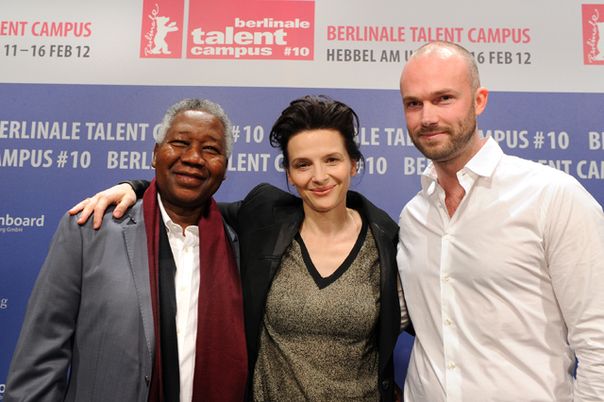Filmmaking without Borders
The Berlinale Talent Campus opens its doors for the tenth time with special guests Juliette Binoche and Gaston Kaboré.

The two guests of the Berlinale Talent Campus opening panel with Campus director Matthijs Wouter Knol
Having no limits was the watchword at the Berlinale Talent Campus “Changing Perspectives“ opening panel, featuring Oscar-winning French actress Juliette Binoche and revered Burkinabe director Gaston Kaboré. Moderated by Campus head Matthijs Wouter Knol, it was an interactive forum on breaking out of creative comfort zones and embracing new approaches toward making films that challenge the audience and force them to rethink their views.
For Kaboré, the need to record African history and culture led him to cinema, which he considers the shortest, most effective route to telling stories. His work constantly attempts to challenge and alter traditional roles. It’s been 15 years since his last feature film, BUUD YAM (1997). He’s now preparing his return to feature filmmaking – a prospect that, he said, is a little like making his first movie. “What moves me is my will to transfer something to the audience. I do believe that we all have something inside that is desperately trying to be expressed, and this I would love to communicate.”
“We are transformers in our lives,” Binoche said. The CHOCOLAT actress, who's in the Berlinale Panorama entry ELLES, sees the creative process as an “inside journey” that is without limits. Discussing ELLES, in which she stars as a journalist who interviews two student prostitutes, Binoche noted that displaying eroticism on screen means simply reaching beyond herself in order to effectively communicate with her audience. “It has to cost you something,” she said, referencing this letting-go of self that inspires and unleashes creativity. “I want to give myself and give myself totally.” Binoche, who has worked with non-French and non-English speaking directors, sees true art as transcending cultures and languages.
Despite changes to creative practice heralded by evolving technologies, Kaboré and Binoche both agreed that the challenge to artists remains unchanged: “What story do I want to tell? How do I direct? How do I script my story in a way that can communicate something to the audience?” Technology need not get in the way, said Binoche. “I love to see change; it has to be subtle and sometimes you need to play less so that the audience can see more.” What is necessary, both concluded, was remaining true to one’s self as transforming and transformative beings.


301 Moved Permanently